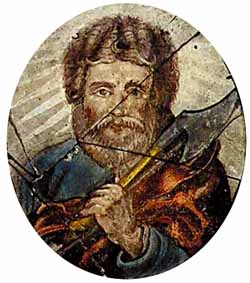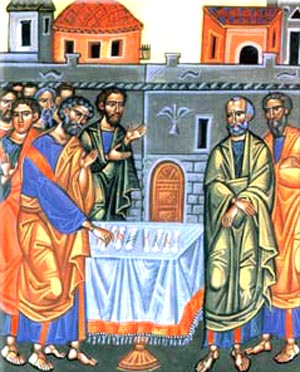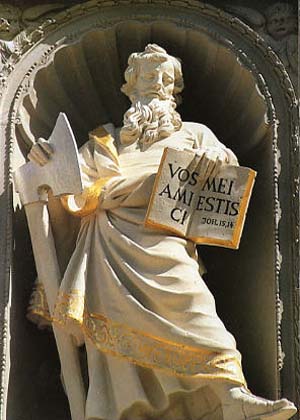 |
The Saint of the Day
St. Matthias the Apostle – February 24
Prof. Plinio Corrêa de Oliveira
Biographical selection:

St. Matthias
|
Matthias was one of the 72 disciples of Our Lord; he was chosen to replace Judas Iscariot in the College of the Twelve Apostles. There is not much information about him.
According to a Greek tradition, he preached the Gospel in Cappadocia and in regions bordering the Caspian Sea. Tradition tells us he suffered martyrdom in present day Ethiopia, where he was stoned, and then beheaded.
Some parts of his doctrine were conserved by Clement of Alexandria. This sentence is attributed to the Apostle:
“We must combat the flesh, taking what advantages we can without giving it blameworthy delights. Regarding the soul, we should develop it through intelligence and faith.”
Comments of Prof. Plinio:
We can imagine what was, or what could have been the life of St. Matthias. There are many persons in the Gospel about whom little is said. However, by examining the nature of the mission of the person, we can reconstitute his or her personality. So, the little that is said about them invites us to compose their personalities.

The Apostles cast lots to choose the replacement for Judas
|
The most illustrious example of this is St. Joseph. There is almost nothing said about him. We know his mission, however, and that he accomplished it successfully. Essentially what the Gospel tells us is that he was a just man, nothing else. But there are a thousand things that we can envisage regarding St. Joseph by the fact that he was chosen to be the worthy Spouse of Our Lady. We can understand, therefore, much about him, even though the Gospel is silent.
An analogous sketch can be made of St. Matthias. The Apostolic College suffered an enormous blow with the treason of Judas. It was, perhaps, the most significant blow ever received by the Catholic Church throughout the centuries. The place of Judas became empty. It was necessary to replace him with someone who, by his virtue, would make reparation to Divine Justice for the sin and evil committed by Judas. This new Apostle needed to be excellent along the same lines wherein Judas was evil; he should be the anti-Judas. He should be admirable and laudable in those very points where Judas was execrable and abominable. So, to achieve this contrast, we should picture St. Matthias as the Apostle of detachment from material goods, the Apostle of honesty and loyalty. Considering him in opposition to Judas reveals some aspects of his mission and of his character.
He left a beautiful statement regarding the kind of combat we should make against the vices of the flesh. He says that we should take advantage of the correct tendencies of the flesh and avoid making any concession to what is evil. It is a consideration that primarily applies to the lay Catholic who is turned to a normal life in the world. He is not called to lead the life of an austere religious man, but to enjoy the honest pleasures of life, without any dishonest concessions.

Statue at St. Matthias Abbey in Trier, where relics of the Apostle are kept
|
These words translate what St. Matthias saw in the example of his Divine Master. Indeed, Our Lord used to go to refined banquets such as at the wedding of Canaan or at the house of Lazarus, or at the Last Supper. He also took pleasure in the exquisite perfume that Mary Magdalene poured on His Feet. He partook of these pleasures, of course, with an extreme temperance, giving to each the correct place it deserved for the glory of God, without any concession to evil. That is to say, the words of St. Matthias describe Our Lord’s behavior in face of life. It provides a very good orientation for Catholics.
In this balanced attitude toward life to which St. Matthias counsels us, we can also see the opposite of Judas who had an unbalanced craving for money, a strong avarice. By yielding to this vice, he became a thief, pilfering money destined for Our Lord and the Apostles as well as for the poor. This vice went so far as to induce him to sell his Lord and his God for thirty silver coins. This is one example that shows us St. Matthias’ vocation as opposed to the actions of Judas.
It does not give a complete picture of his life, but pierces the veil of silence that surrounds him. Only at the Last Judgment shall we know how he fully accomplished his vocation, which before God wiped out the stain left by Judas in the primitive Church.
Let us ask St. Matthias to intercede for us and give us loyalty, honesty, detachment and equilibrium in face of the sufferings and pleasures of life.


  |
| Prof. Plinio Corrêa de Oliveira | |
The Saint of the Day features highlights from the lives of saints based on comments made by the late Prof. Plinio Corrêa de Oliveira. Following the example of St. John Bosco who used to make similar talks for the boys of his College, each evening it was Prof. Plinio’s custom to make a short commentary on the lives of the next day’s saint in a meeting for youth in order to encourage them in the practice of virtue and love for the Catholic Church. TIA thought that its readers could profit from these valuable commentaries.
The texts of both the biographical data and the comments come from personal notes taken by Atila S. Guimarães from 1964 to 1995. Given the fact that the source is a personal notebook, it is possible that at times the biographic notes transcribed here will not rigorously follow the original text read by Prof. Plinio. The commentaries have also been adapted and translated for TIA’s site.
|
Saint of the Day | Home | Books | CDs | Search | Contact Us | Donate

© 2002- Tradition in Action, Inc. All Rights Reserved
|
 |

|